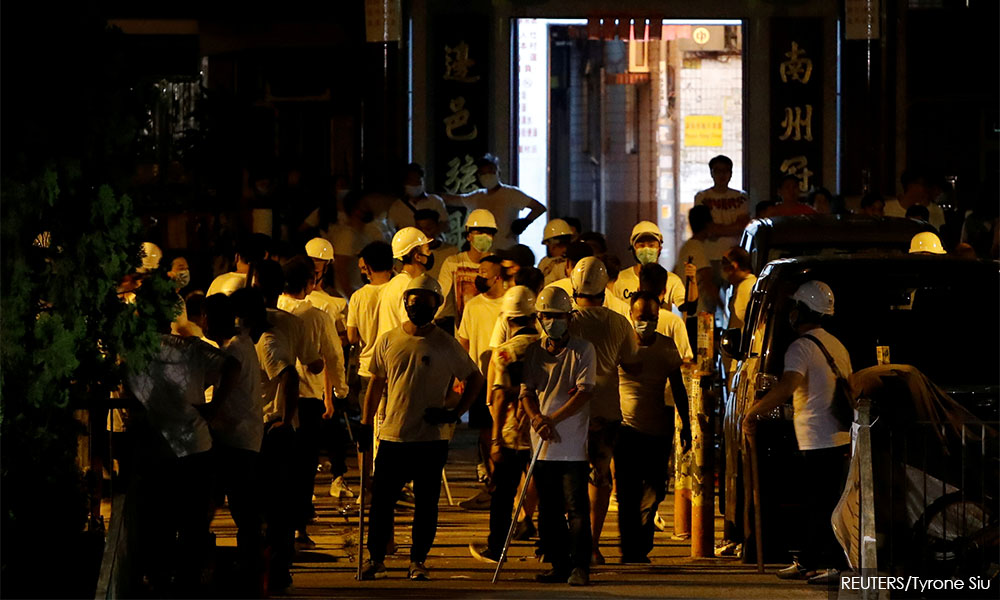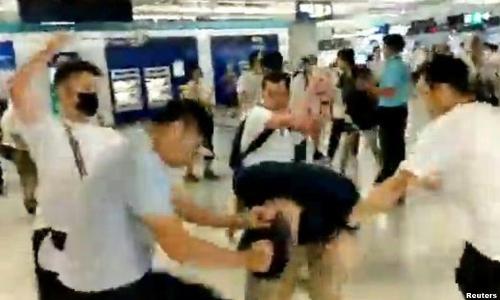Refinitiv removes Reuters story on HK protests from screens in China
Under pressure from Chinese regulators, financial information provider Refinitiv has removed from its Eikon terminals in China a Reuters story detailing how an official with Beijing’s Liaison Office in Hong Kong had urged residents of a rural area to drive away anti-government protesters days before a violent clash nearby, according to Eikon users and a person with knowledge of Refinitiv’s action.
The story, which was published late last week, was not visible on the Eikon terminal’s scrolling news feed in China on Friday. Eikon users outside China said they could still see the story. Reuters was unable to determine precisely when the story had been removed from Eikon’s scrolling news feed for clients in China or whether other stories had been blocked.
Refinitiv has a licence to provide financial information in China, and a person familiar with the matter said Refinitiv’s regulator there, the Cyberspace Administration of China, or CAC, had said it would shut down the service unless it removed or blocked certain political stories.
The person, who asked not to be identified given the sensitivity of the matter, said Refinitiv had agreed to block some political news from its platform in mainland China.
“As a global business, we comply with all our local regulatory obligations, including the requirements of our license to operate in China,” Refinitiv said in a written statement to Reuters.
The CAC did not immediately respond to a request for comment.
In June, Reuters reported that Refinitiv, under pressure from China’s government, had removed from Eikon several Reuters stories related to the 30th anniversary of the violent suppression of pro-democracy demonstrations in Beijing’s Tiananmen Square.

Refinitiv removed the Tiananmen stories after a similar warning from the CAC, people with knowledge of the action said at the time.
“Reuters reports around the world in a fair, unbiased and independent manner, in keeping with the Thomson Reuters Trust Principles, and we stand by our China coverage,” a Reuters spokesman said.
“We continue to provide Refinitiv with the same scope of content that we always have, including stories relating to China, and Refinitiv’s decisions will not affect the breadth or quality of our coverage.”
In June, Reuters president Michael Friedenberg and editor-in-chief Steve Adler said the news organisation had spoken to Refinitiv and expressed its concern about the earlier action to block Reuters stories about the Tiananmen anniversary.
In a memo to staff on Friday, they said Reuters’ position had not changed and that they stood by last week’s story.
“The story - which concerns the protests in Hong Kong - is fair and accurate, and we stand by our reporting. We have expressed our concern and disappointment to Refinitiv that this has happened again,” they said.
Sold by Reuters’ parent company
Refinitiv was formed last year when Reuters News’ parent company Thomson Reuters Corp sold a 55% stake in its Financial & Risk unit to a group led by private equity firm Blackstone Group LP.
On Thursday, London Stock Exchange announced a US$27 billion deal to buy Refinitiv.
Reuters News, a unit of Thomson Reuters, supplies news to Refinitiv under a 30-year agreement that pays Reuters a minimum of US$325 million per year, making Refinitiv the news organisation’s largest customer.
Reuters also provides news for media and digital clients, and their access to stories was not affected.
Censorship in China has been intensifying under President Xi Jinping, and businesses have come under growing pressure to block content that Beijing sees as sensitive.
This is an especially sensitive year for China. In addition to the June 4th Tiananmen anniversary, the country will on Oct 1 mark the 70th anniversary of the founding of the People’s Republic of China.
Hong Kong has been plunged into its biggest political crisis since the former British colony’s return to Chinese rule in 1997. A wave of protests has engulfed Hong Kong since the introduction of a now-suspended extradition bill that would have allowed people to be sent to mainland China for trial in Communist Party controlled courts.
The Reuters story blocked by Refinitiv reported that an official from China’s representative office had used a July 11 banquet for hundreds of villagers in Hong Kong’s rural New Territories to urge residents to protect their towns in the Yuen Long district and to drive away protesters.
On July 21, after anti-government protesters marched in central Hong Kong and defaced China’s Liaison Office, more than 100 men swarmed through Yuen Long train station, attacking black-clad protesters and others with pipes and clubs. Forty-five people were injured, one critically.
In a statement released on its website last Friday, China’s Liaison Office rejected what it called false rumours linking it to the violence in Yuen Long, although the statement did not mention Reuters directly or address the speech reported by Reuters.
- Reuters
RM12.50 / month
- Unlimited access to award-winning journalism
- Comment and share your opinions on all our articles
- Gift interesting stories to your friends
- Tax deductable
